Analysis of the Legal System for Business Law in the UK
VerifiedAdded on 2023/06/12
|9
|2669
|398
Report
AI Summary
This report provides a detailed overview of the UK legal system as it pertains to business law. It classifies laws into civil and criminal categories, explains the roles of the High Court and Supreme Court, and explores sources of law, including case law and legislation. The report also delves into the process of making legislation, including delegated legislation, and examines UK employment law, focusing on statutory duties of employers and actions related to wrongful and unfair dismissal. This comprehensive analysis aims to provide a clear understanding of the legal framework governing business operations in the United Kingdom, offering valuable insights for students and professionals alike. Desklib provides access to this and other solved assignments.
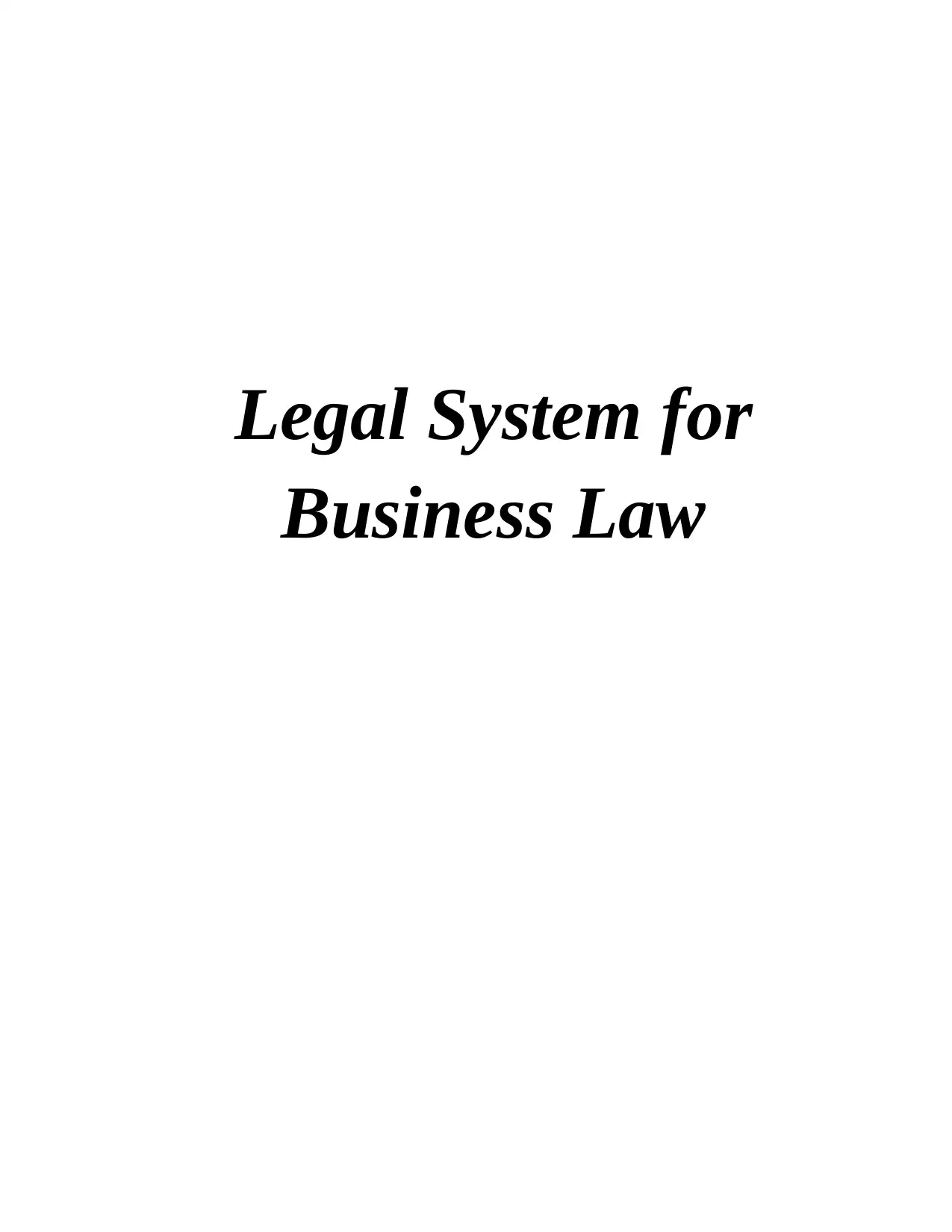
Legal System for
Business Law
Business Law
Paraphrase This Document
Need a fresh take? Get an instant paraphrase of this document with our AI Paraphraser
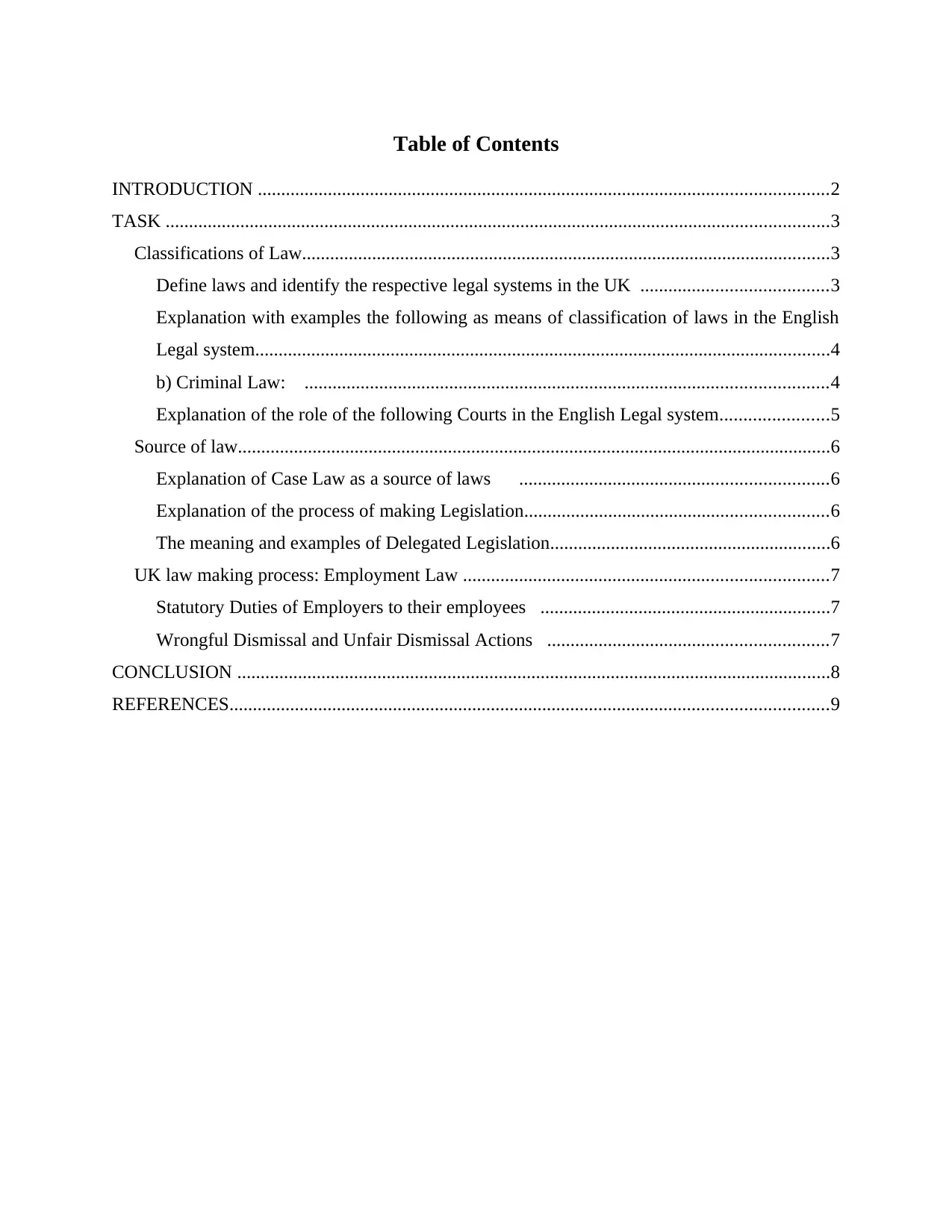
Table of Contents
INTRODUCTION ..........................................................................................................................2
TASK ..............................................................................................................................................3
Classifications of Law.................................................................................................................3
Define laws and identify the respective legal systems in the UK ........................................3
Explanation with examples the following as means of classification of laws in the English
Legal system...........................................................................................................................4
b) Criminal Law: ................................................................................................................4
Explanation of the role of the following Courts in the English Legal system.......................5
Source of law...............................................................................................................................6
Explanation of Case Law as a source of laws ..................................................................6
Explanation of the process of making Legislation.................................................................6
The meaning and examples of Delegated Legislation............................................................6
UK law making process: Employment Law ..............................................................................7
Statutory Duties of Employers to their employees ..............................................................7
Wrongful Dismissal and Unfair Dismissal Actions ............................................................7
CONCLUSION ...............................................................................................................................8
REFERENCES................................................................................................................................9
INTRODUCTION ..........................................................................................................................2
TASK ..............................................................................................................................................3
Classifications of Law.................................................................................................................3
Define laws and identify the respective legal systems in the UK ........................................3
Explanation with examples the following as means of classification of laws in the English
Legal system...........................................................................................................................4
b) Criminal Law: ................................................................................................................4
Explanation of the role of the following Courts in the English Legal system.......................5
Source of law...............................................................................................................................6
Explanation of Case Law as a source of laws ..................................................................6
Explanation of the process of making Legislation.................................................................6
The meaning and examples of Delegated Legislation............................................................6
UK law making process: Employment Law ..............................................................................7
Statutory Duties of Employers to their employees ..............................................................7
Wrongful Dismissal and Unfair Dismissal Actions ............................................................7
CONCLUSION ...............................................................................................................................8
REFERENCES................................................................................................................................9
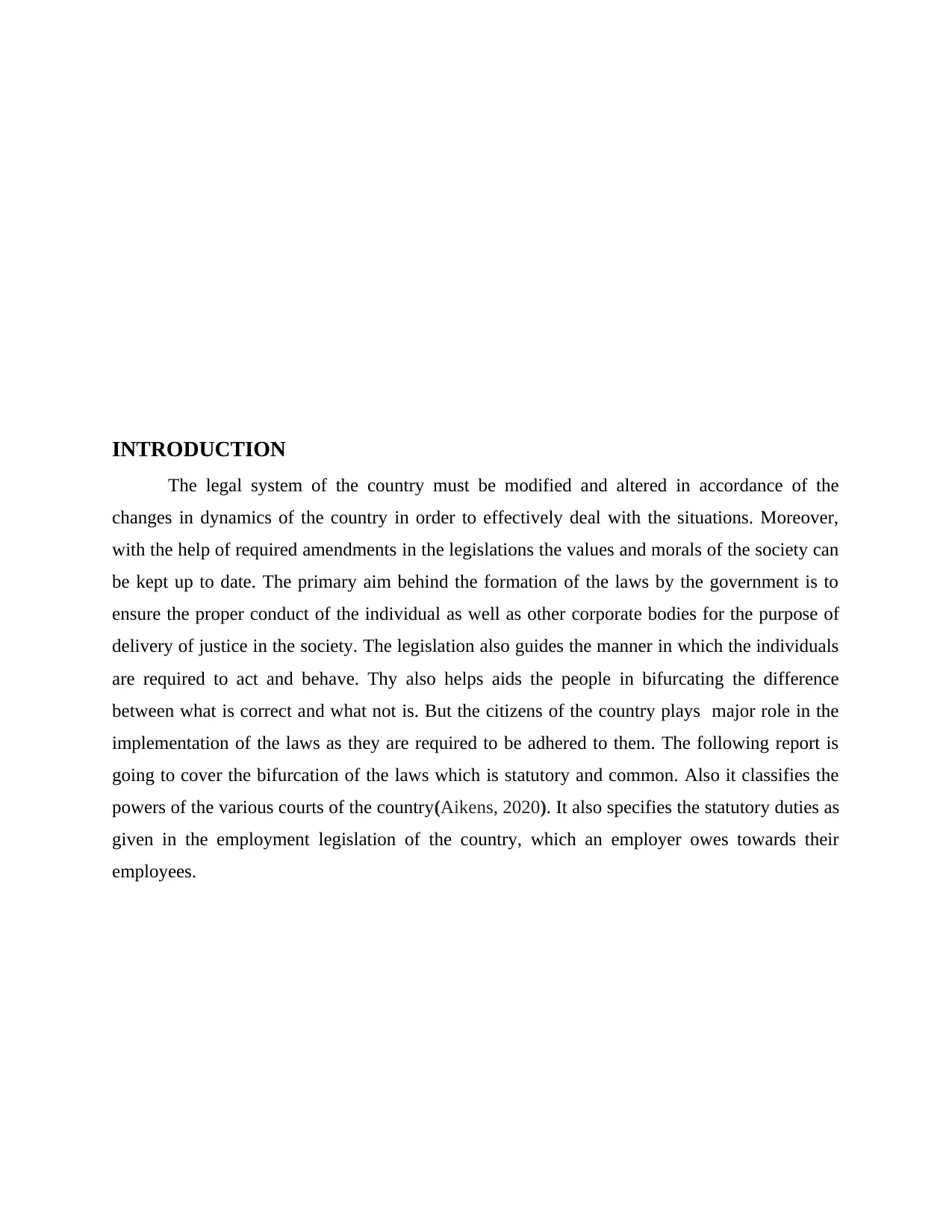
INTRODUCTION
The legal system of the country must be modified and altered in accordance of the
changes in dynamics of the country in order to effectively deal with the situations. Moreover,
with the help of required amendments in the legislations the values and morals of the society can
be kept up to date. The primary aim behind the formation of the laws by the government is to
ensure the proper conduct of the individual as well as other corporate bodies for the purpose of
delivery of justice in the society. The legislation also guides the manner in which the individuals
are required to act and behave. Thy also helps aids the people in bifurcating the difference
between what is correct and what not is. But the citizens of the country plays major role in the
implementation of the laws as they are required to be adhered to them. The following report is
going to cover the bifurcation of the laws which is statutory and common. Also it classifies the
powers of the various courts of the country(Aikens, 2020). It also specifies the statutory duties as
given in the employment legislation of the country, which an employer owes towards their
employees.
The legal system of the country must be modified and altered in accordance of the
changes in dynamics of the country in order to effectively deal with the situations. Moreover,
with the help of required amendments in the legislations the values and morals of the society can
be kept up to date. The primary aim behind the formation of the laws by the government is to
ensure the proper conduct of the individual as well as other corporate bodies for the purpose of
delivery of justice in the society. The legislation also guides the manner in which the individuals
are required to act and behave. Thy also helps aids the people in bifurcating the difference
between what is correct and what not is. But the citizens of the country plays major role in the
implementation of the laws as they are required to be adhered to them. The following report is
going to cover the bifurcation of the laws which is statutory and common. Also it classifies the
powers of the various courts of the country(Aikens, 2020). It also specifies the statutory duties as
given in the employment legislation of the country, which an employer owes towards their
employees.
⊘ This is a preview!⊘
Do you want full access?
Subscribe today to unlock all pages.

Trusted by 1+ million students worldwide
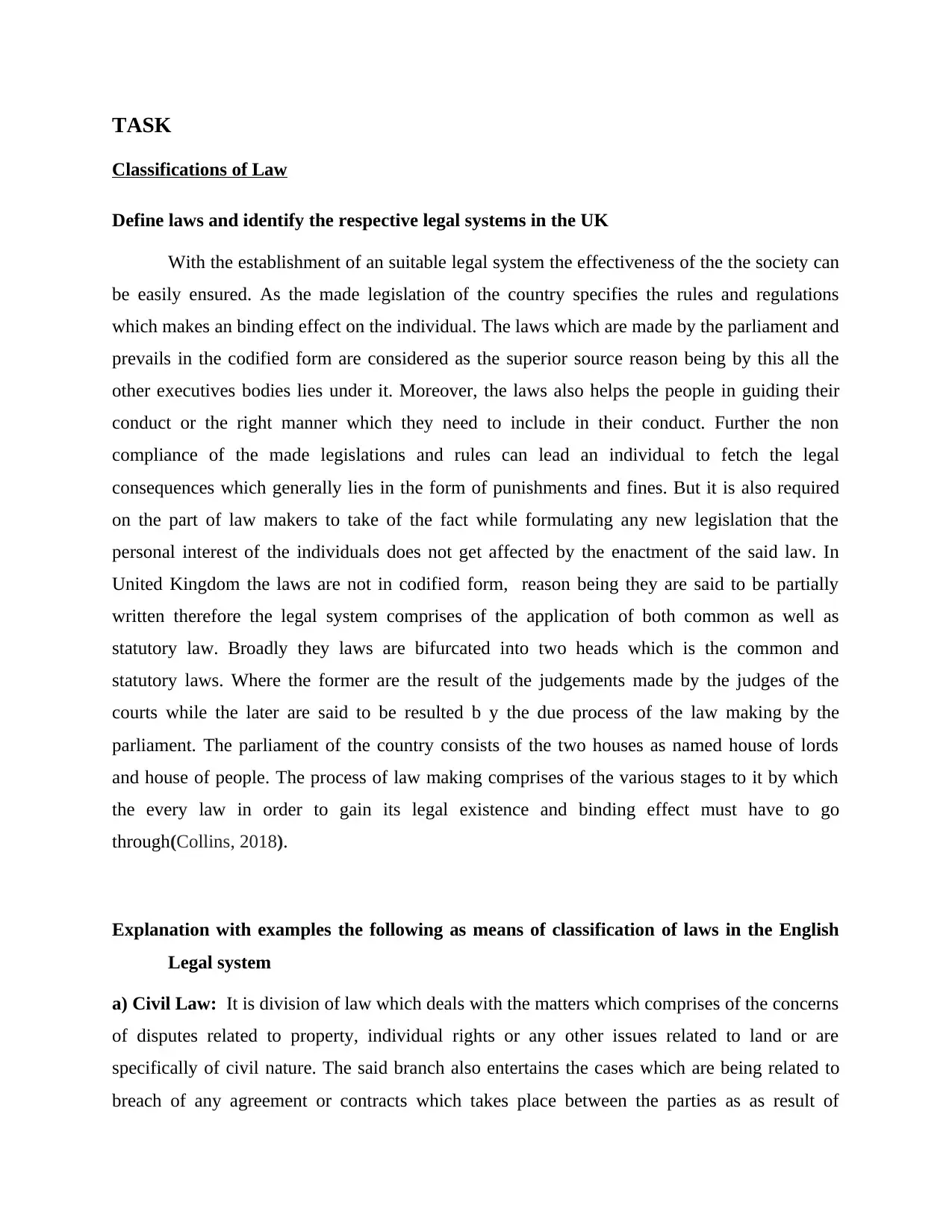
TASK
Classifications of Law
Define laws and identify the respective legal systems in the UK
With the establishment of an suitable legal system the effectiveness of the the society can
be easily ensured. As the made legislation of the country specifies the rules and regulations
which makes an binding effect on the individual. The laws which are made by the parliament and
prevails in the codified form are considered as the superior source reason being by this all the
other executives bodies lies under it. Moreover, the laws also helps the people in guiding their
conduct or the right manner which they need to include in their conduct. Further the non
compliance of the made legislations and rules can lead an individual to fetch the legal
consequences which generally lies in the form of punishments and fines. But it is also required
on the part of law makers to take of the fact while formulating any new legislation that the
personal interest of the individuals does not get affected by the enactment of the said law. In
United Kingdom the laws are not in codified form, reason being they are said to be partially
written therefore the legal system comprises of the application of both common as well as
statutory law. Broadly they laws are bifurcated into two heads which is the common and
statutory laws. Where the former are the result of the judgements made by the judges of the
courts while the later are said to be resulted b y the due process of the law making by the
parliament. The parliament of the country consists of the two houses as named house of lords
and house of people. The process of law making comprises of the various stages to it by which
the every law in order to gain its legal existence and binding effect must have to go
through(Collins, 2018).
Explanation with examples the following as means of classification of laws in the English
Legal system
a) Civil Law: It is division of law which deals with the matters which comprises of the concerns
of disputes related to property, individual rights or any other issues related to land or are
specifically of civil nature. The said branch also entertains the cases which are being related to
breach of any agreement or contracts which takes place between the parties as as result of
Classifications of Law
Define laws and identify the respective legal systems in the UK
With the establishment of an suitable legal system the effectiveness of the the society can
be easily ensured. As the made legislation of the country specifies the rules and regulations
which makes an binding effect on the individual. The laws which are made by the parliament and
prevails in the codified form are considered as the superior source reason being by this all the
other executives bodies lies under it. Moreover, the laws also helps the people in guiding their
conduct or the right manner which they need to include in their conduct. Further the non
compliance of the made legislations and rules can lead an individual to fetch the legal
consequences which generally lies in the form of punishments and fines. But it is also required
on the part of law makers to take of the fact while formulating any new legislation that the
personal interest of the individuals does not get affected by the enactment of the said law. In
United Kingdom the laws are not in codified form, reason being they are said to be partially
written therefore the legal system comprises of the application of both common as well as
statutory law. Broadly they laws are bifurcated into two heads which is the common and
statutory laws. Where the former are the result of the judgements made by the judges of the
courts while the later are said to be resulted b y the due process of the law making by the
parliament. The parliament of the country consists of the two houses as named house of lords
and house of people. The process of law making comprises of the various stages to it by which
the every law in order to gain its legal existence and binding effect must have to go
through(Collins, 2018).
Explanation with examples the following as means of classification of laws in the English
Legal system
a) Civil Law: It is division of law which deals with the matters which comprises of the concerns
of disputes related to property, individual rights or any other issues related to land or are
specifically of civil nature. The said branch also entertains the cases which are being related to
breach of any agreement or contracts which takes place between the parties as as result of
Paraphrase This Document
Need a fresh take? Get an instant paraphrase of this document with our AI Paraphraser
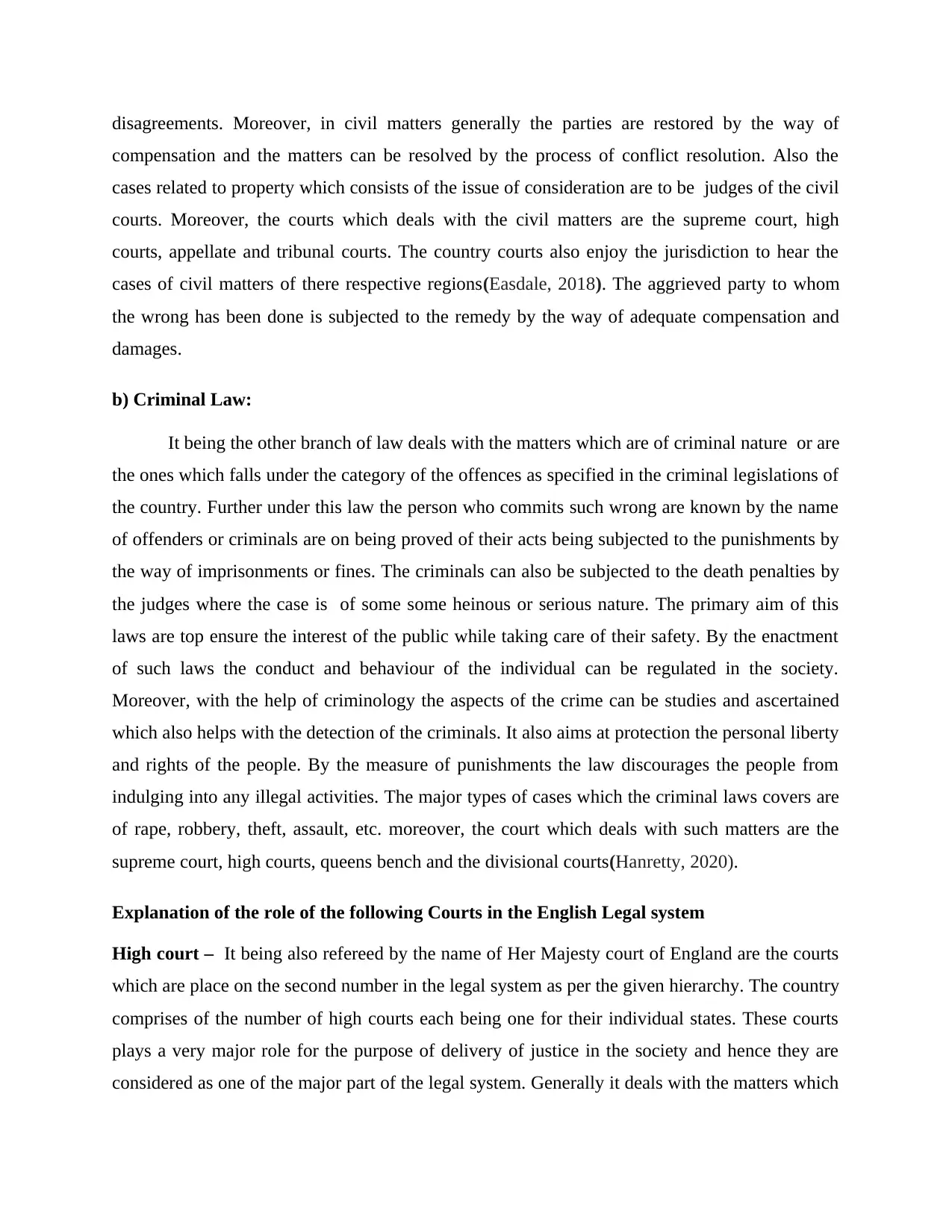
disagreements. Moreover, in civil matters generally the parties are restored by the way of
compensation and the matters can be resolved by the process of conflict resolution. Also the
cases related to property which consists of the issue of consideration are to be judges of the civil
courts. Moreover, the courts which deals with the civil matters are the supreme court, high
courts, appellate and tribunal courts. The country courts also enjoy the jurisdiction to hear the
cases of civil matters of there respective regions(Easdale, 2018). The aggrieved party to whom
the wrong has been done is subjected to the remedy by the way of adequate compensation and
damages.
b) Criminal Law:
It being the other branch of law deals with the matters which are of criminal nature or are
the ones which falls under the category of the offences as specified in the criminal legislations of
the country. Further under this law the person who commits such wrong are known by the name
of offenders or criminals are on being proved of their acts being subjected to the punishments by
the way of imprisonments or fines. The criminals can also be subjected to the death penalties by
the judges where the case is of some some heinous or serious nature. The primary aim of this
laws are top ensure the interest of the public while taking care of their safety. By the enactment
of such laws the conduct and behaviour of the individual can be regulated in the society.
Moreover, with the help of criminology the aspects of the crime can be studies and ascertained
which also helps with the detection of the criminals. It also aims at protection the personal liberty
and rights of the people. By the measure of punishments the law discourages the people from
indulging into any illegal activities. The major types of cases which the criminal laws covers are
of rape, robbery, theft, assault, etc. moreover, the court which deals with such matters are the
supreme court, high courts, queens bench and the divisional courts(Hanretty, 2020).
Explanation of the role of the following Courts in the English Legal system
High court – It being also refereed by the name of Her Majesty court of England are the courts
which are place on the second number in the legal system as per the given hierarchy. The country
comprises of the number of high courts each being one for their individual states. These courts
plays a very major role for the purpose of delivery of justice in the society and hence they are
considered as one of the major part of the legal system. Generally it deals with the matters which
compensation and the matters can be resolved by the process of conflict resolution. Also the
cases related to property which consists of the issue of consideration are to be judges of the civil
courts. Moreover, the courts which deals with the civil matters are the supreme court, high
courts, appellate and tribunal courts. The country courts also enjoy the jurisdiction to hear the
cases of civil matters of there respective regions(Easdale, 2018). The aggrieved party to whom
the wrong has been done is subjected to the remedy by the way of adequate compensation and
damages.
b) Criminal Law:
It being the other branch of law deals with the matters which are of criminal nature or are
the ones which falls under the category of the offences as specified in the criminal legislations of
the country. Further under this law the person who commits such wrong are known by the name
of offenders or criminals are on being proved of their acts being subjected to the punishments by
the way of imprisonments or fines. The criminals can also be subjected to the death penalties by
the judges where the case is of some some heinous or serious nature. The primary aim of this
laws are top ensure the interest of the public while taking care of their safety. By the enactment
of such laws the conduct and behaviour of the individual can be regulated in the society.
Moreover, with the help of criminology the aspects of the crime can be studies and ascertained
which also helps with the detection of the criminals. It also aims at protection the personal liberty
and rights of the people. By the measure of punishments the law discourages the people from
indulging into any illegal activities. The major types of cases which the criminal laws covers are
of rape, robbery, theft, assault, etc. moreover, the court which deals with such matters are the
supreme court, high courts, queens bench and the divisional courts(Hanretty, 2020).
Explanation of the role of the following Courts in the English Legal system
High court – It being also refereed by the name of Her Majesty court of England are the courts
which are place on the second number in the legal system as per the given hierarchy. The country
comprises of the number of high courts each being one for their individual states. These courts
plays a very major role for the purpose of delivery of justice in the society and hence they are
considered as one of the major part of the legal system. Generally it deals with the matters which
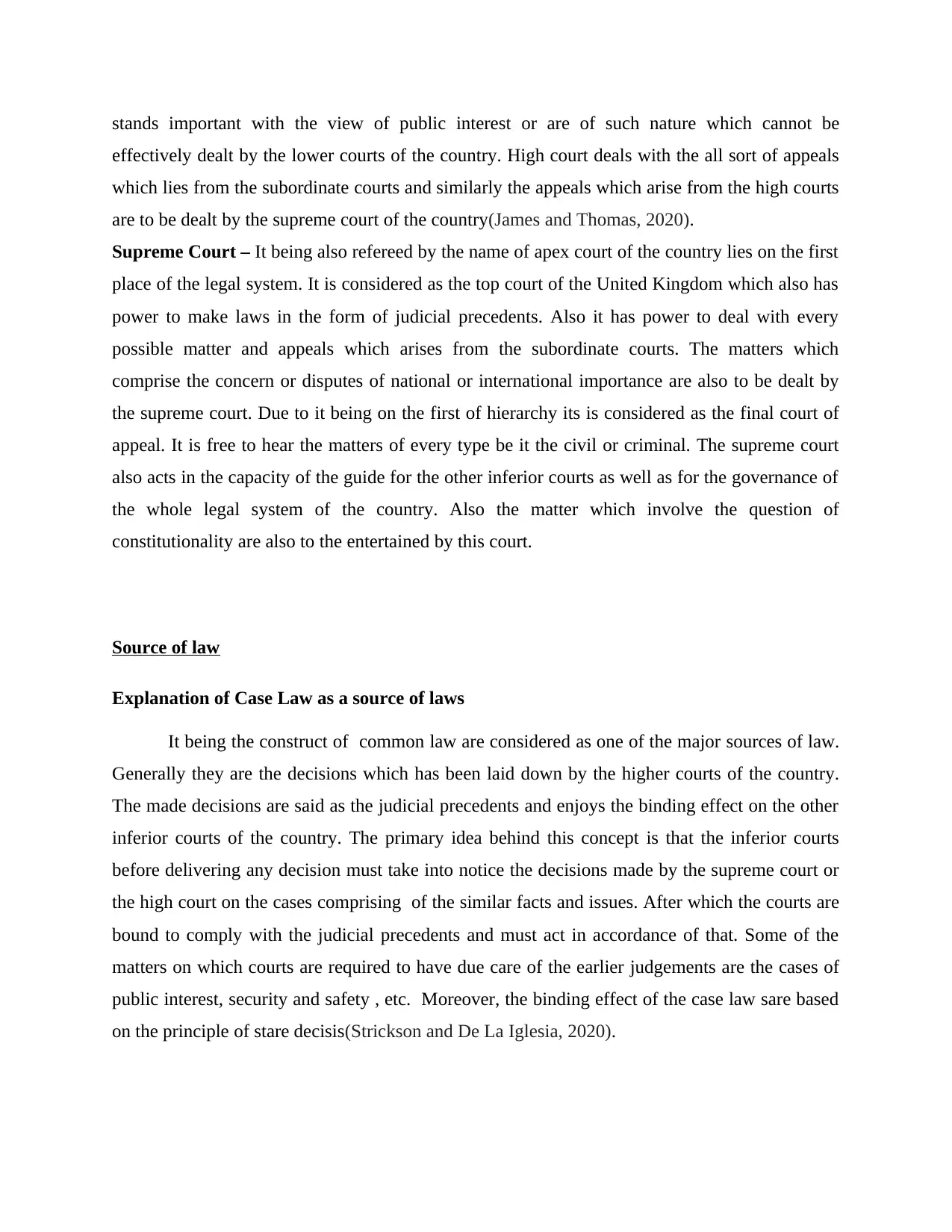
stands important with the view of public interest or are of such nature which cannot be
effectively dealt by the lower courts of the country. High court deals with the all sort of appeals
which lies from the subordinate courts and similarly the appeals which arise from the high courts
are to be dealt by the supreme court of the country(James and Thomas, 2020).
Supreme Court – It being also refereed by the name of apex court of the country lies on the first
place of the legal system. It is considered as the top court of the United Kingdom which also has
power to make laws in the form of judicial precedents. Also it has power to deal with every
possible matter and appeals which arises from the subordinate courts. The matters which
comprise the concern or disputes of national or international importance are also to be dealt by
the supreme court. Due to it being on the first of hierarchy its is considered as the final court of
appeal. It is free to hear the matters of every type be it the civil or criminal. The supreme court
also acts in the capacity of the guide for the other inferior courts as well as for the governance of
the whole legal system of the country. Also the matter which involve the question of
constitutionality are also to the entertained by this court.
Source of law
Explanation of Case Law as a source of laws
It being the construct of common law are considered as one of the major sources of law.
Generally they are the decisions which has been laid down by the higher courts of the country.
The made decisions are said as the judicial precedents and enjoys the binding effect on the other
inferior courts of the country. The primary idea behind this concept is that the inferior courts
before delivering any decision must take into notice the decisions made by the supreme court or
the high court on the cases comprising of the similar facts and issues. After which the courts are
bound to comply with the judicial precedents and must act in accordance of that. Some of the
matters on which courts are required to have due care of the earlier judgements are the cases of
public interest, security and safety , etc. Moreover, the binding effect of the case law sare based
on the principle of stare decisis(Strickson and De La Iglesia, 2020).
effectively dealt by the lower courts of the country. High court deals with the all sort of appeals
which lies from the subordinate courts and similarly the appeals which arise from the high courts
are to be dealt by the supreme court of the country(James and Thomas, 2020).
Supreme Court – It being also refereed by the name of apex court of the country lies on the first
place of the legal system. It is considered as the top court of the United Kingdom which also has
power to make laws in the form of judicial precedents. Also it has power to deal with every
possible matter and appeals which arises from the subordinate courts. The matters which
comprise the concern or disputes of national or international importance are also to be dealt by
the supreme court. Due to it being on the first of hierarchy its is considered as the final court of
appeal. It is free to hear the matters of every type be it the civil or criminal. The supreme court
also acts in the capacity of the guide for the other inferior courts as well as for the governance of
the whole legal system of the country. Also the matter which involve the question of
constitutionality are also to the entertained by this court.
Source of law
Explanation of Case Law as a source of laws
It being the construct of common law are considered as one of the major sources of law.
Generally they are the decisions which has been laid down by the higher courts of the country.
The made decisions are said as the judicial precedents and enjoys the binding effect on the other
inferior courts of the country. The primary idea behind this concept is that the inferior courts
before delivering any decision must take into notice the decisions made by the supreme court or
the high court on the cases comprising of the similar facts and issues. After which the courts are
bound to comply with the judicial precedents and must act in accordance of that. Some of the
matters on which courts are required to have due care of the earlier judgements are the cases of
public interest, security and safety , etc. Moreover, the binding effect of the case law sare based
on the principle of stare decisis(Strickson and De La Iglesia, 2020).
⊘ This is a preview!⊘
Do you want full access?
Subscribe today to unlock all pages.

Trusted by 1+ million students worldwide
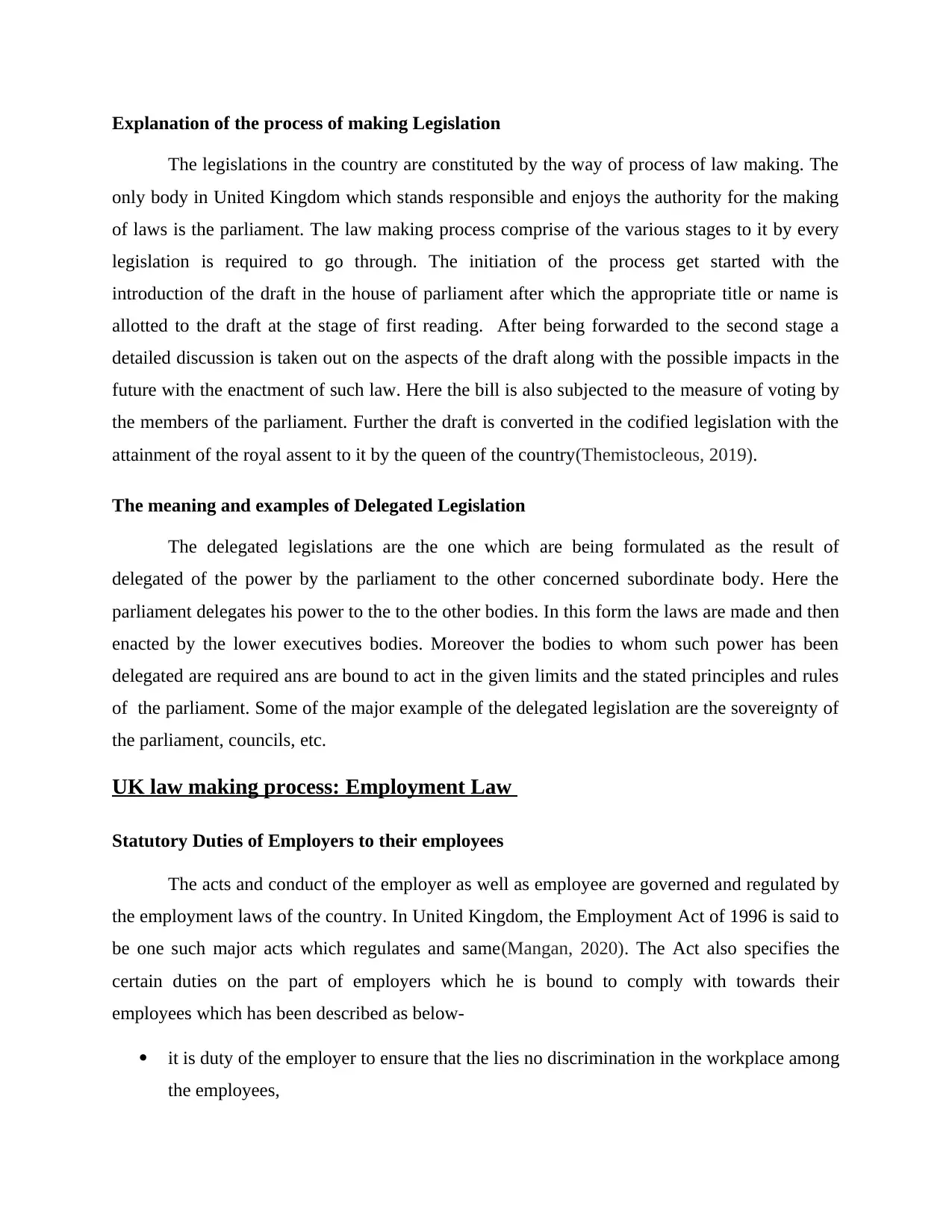
Explanation of the process of making Legislation
The legislations in the country are constituted by the way of process of law making. The
only body in United Kingdom which stands responsible and enjoys the authority for the making
of laws is the parliament. The law making process comprise of the various stages to it by every
legislation is required to go through. The initiation of the process get started with the
introduction of the draft in the house of parliament after which the appropriate title or name is
allotted to the draft at the stage of first reading. After being forwarded to the second stage a
detailed discussion is taken out on the aspects of the draft along with the possible impacts in the
future with the enactment of such law. Here the bill is also subjected to the measure of voting by
the members of the parliament. Further the draft is converted in the codified legislation with the
attainment of the royal assent to it by the queen of the country(Themistocleous, 2019).
The meaning and examples of Delegated Legislation
The delegated legislations are the one which are being formulated as the result of
delegated of the power by the parliament to the other concerned subordinate body. Here the
parliament delegates his power to the to the other bodies. In this form the laws are made and then
enacted by the lower executives bodies. Moreover the bodies to whom such power has been
delegated are required ans are bound to act in the given limits and the stated principles and rules
of the parliament. Some of the major example of the delegated legislation are the sovereignty of
the parliament, councils, etc.
UK law making process: Employment Law
Statutory Duties of Employers to their employees
The acts and conduct of the employer as well as employee are governed and regulated by
the employment laws of the country. In United Kingdom, the Employment Act of 1996 is said to
be one such major acts which regulates and same(Mangan, 2020). The Act also specifies the
certain duties on the part of employers which he is bound to comply with towards their
employees which has been described as below-
it is duty of the employer to ensure that the lies no discrimination in the workplace among
the employees,
The legislations in the country are constituted by the way of process of law making. The
only body in United Kingdom which stands responsible and enjoys the authority for the making
of laws is the parliament. The law making process comprise of the various stages to it by every
legislation is required to go through. The initiation of the process get started with the
introduction of the draft in the house of parliament after which the appropriate title or name is
allotted to the draft at the stage of first reading. After being forwarded to the second stage a
detailed discussion is taken out on the aspects of the draft along with the possible impacts in the
future with the enactment of such law. Here the bill is also subjected to the measure of voting by
the members of the parliament. Further the draft is converted in the codified legislation with the
attainment of the royal assent to it by the queen of the country(Themistocleous, 2019).
The meaning and examples of Delegated Legislation
The delegated legislations are the one which are being formulated as the result of
delegated of the power by the parliament to the other concerned subordinate body. Here the
parliament delegates his power to the to the other bodies. In this form the laws are made and then
enacted by the lower executives bodies. Moreover the bodies to whom such power has been
delegated are required ans are bound to act in the given limits and the stated principles and rules
of the parliament. Some of the major example of the delegated legislation are the sovereignty of
the parliament, councils, etc.
UK law making process: Employment Law
Statutory Duties of Employers to their employees
The acts and conduct of the employer as well as employee are governed and regulated by
the employment laws of the country. In United Kingdom, the Employment Act of 1996 is said to
be one such major acts which regulates and same(Mangan, 2020). The Act also specifies the
certain duties on the part of employers which he is bound to comply with towards their
employees which has been described as below-
it is duty of the employer to ensure that the lies no discrimination in the workplace among
the employees,
Paraphrase This Document
Need a fresh take? Get an instant paraphrase of this document with our AI Paraphraser
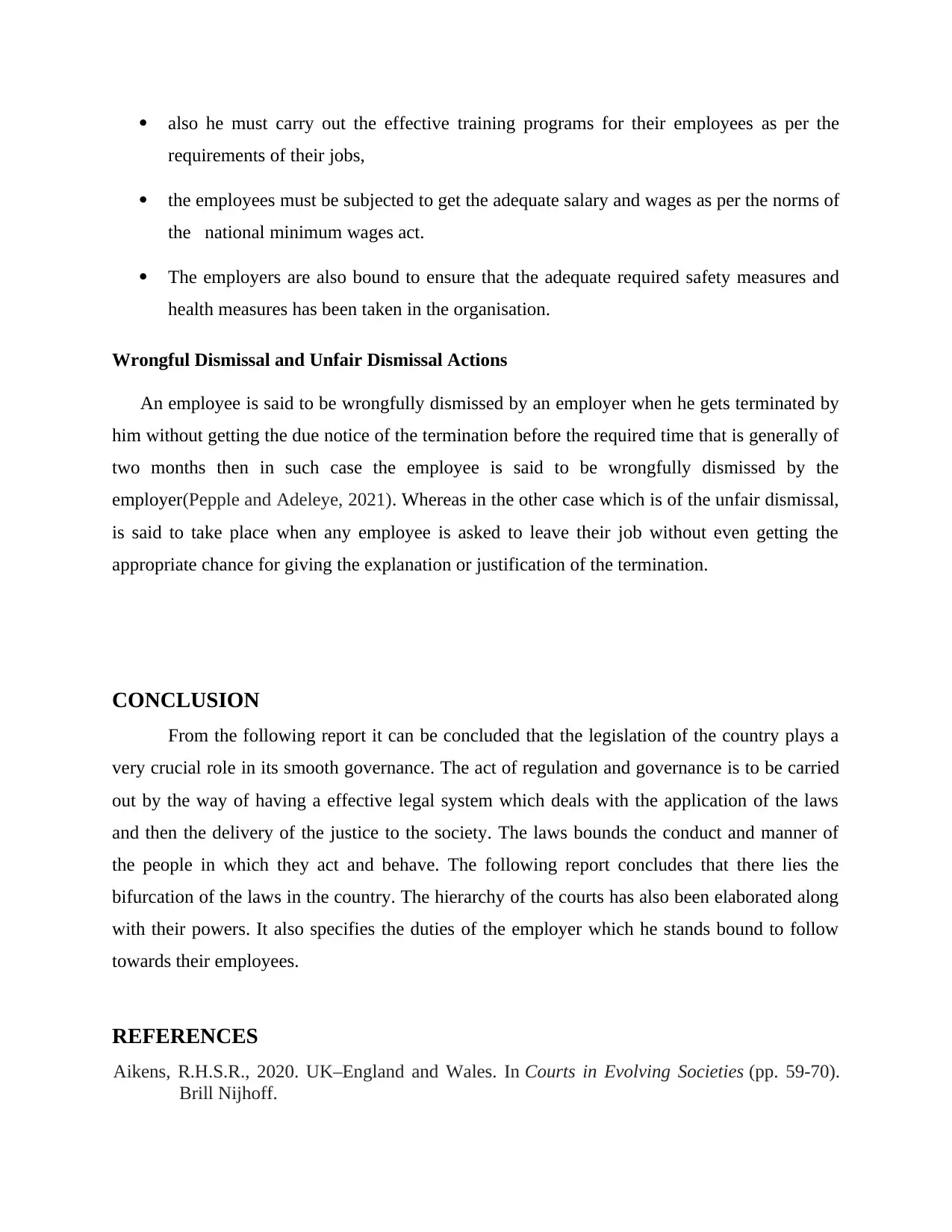
also he must carry out the effective training programs for their employees as per the
requirements of their jobs,
the employees must be subjected to get the adequate salary and wages as per the norms of
the national minimum wages act.
The employers are also bound to ensure that the adequate required safety measures and
health measures has been taken in the organisation.
Wrongful Dismissal and Unfair Dismissal Actions
An employee is said to be wrongfully dismissed by an employer when he gets terminated by
him without getting the due notice of the termination before the required time that is generally of
two months then in such case the employee is said to be wrongfully dismissed by the
employer(Pepple and Adeleye, 2021). Whereas in the other case which is of the unfair dismissal,
is said to take place when any employee is asked to leave their job without even getting the
appropriate chance for giving the explanation or justification of the termination.
CONCLUSION
From the following report it can be concluded that the legislation of the country plays a
very crucial role in its smooth governance. The act of regulation and governance is to be carried
out by the way of having a effective legal system which deals with the application of the laws
and then the delivery of the justice to the society. The laws bounds the conduct and manner of
the people in which they act and behave. The following report concludes that there lies the
bifurcation of the laws in the country. The hierarchy of the courts has also been elaborated along
with their powers. It also specifies the duties of the employer which he stands bound to follow
towards their employees.
REFERENCES
Aikens, R.H.S.R., 2020. UK–England and Wales. In Courts in Evolving Societies (pp. 59-70).
Brill Nijhoff.
requirements of their jobs,
the employees must be subjected to get the adequate salary and wages as per the norms of
the national minimum wages act.
The employers are also bound to ensure that the adequate required safety measures and
health measures has been taken in the organisation.
Wrongful Dismissal and Unfair Dismissal Actions
An employee is said to be wrongfully dismissed by an employer when he gets terminated by
him without getting the due notice of the termination before the required time that is generally of
two months then in such case the employee is said to be wrongfully dismissed by the
employer(Pepple and Adeleye, 2021). Whereas in the other case which is of the unfair dismissal,
is said to take place when any employee is asked to leave their job without even getting the
appropriate chance for giving the explanation or justification of the termination.
CONCLUSION
From the following report it can be concluded that the legislation of the country plays a
very crucial role in its smooth governance. The act of regulation and governance is to be carried
out by the way of having a effective legal system which deals with the application of the laws
and then the delivery of the justice to the society. The laws bounds the conduct and manner of
the people in which they act and behave. The following report concludes that there lies the
bifurcation of the laws in the country. The hierarchy of the courts has also been elaborated along
with their powers. It also specifies the duties of the employer which he stands bound to follow
towards their employees.
REFERENCES
Aikens, R.H.S.R., 2020. UK–England and Wales. In Courts in Evolving Societies (pp. 59-70).
Brill Nijhoff.
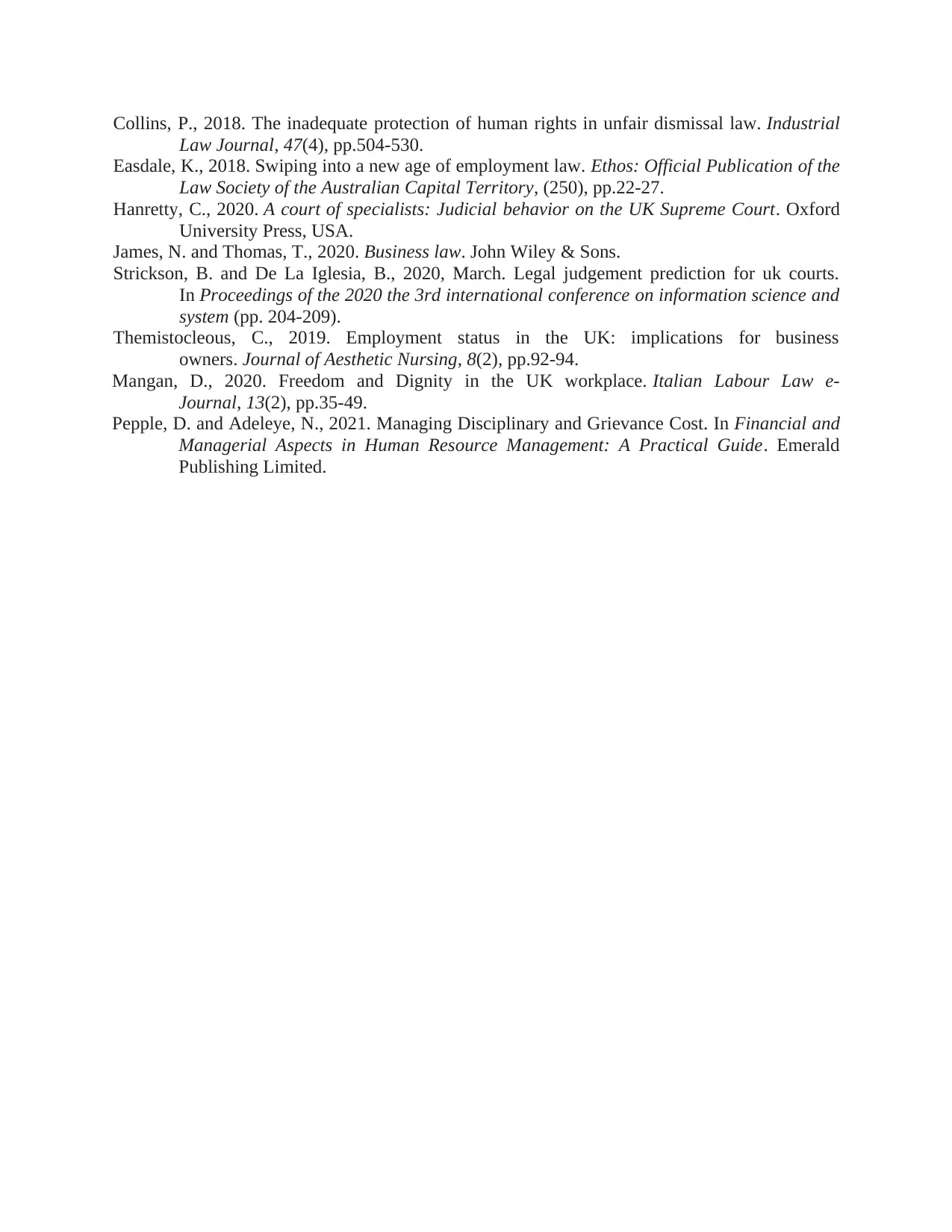
Collins, P., 2018. The inadequate protection of human rights in unfair dismissal law. Industrial
Law Journal, 47(4), pp.504-530.
Easdale, K., 2018. Swiping into a new age of employment law. Ethos: Official Publication of the
Law Society of the Australian Capital Territory, (250), pp.22-27.
Hanretty, C., 2020. A court of specialists: Judicial behavior on the UK Supreme Court. Oxford
University Press, USA.
James, N. and Thomas, T., 2020. Business law. John Wiley & Sons.
Strickson, B. and De La Iglesia, B., 2020, March. Legal judgement prediction for uk courts.
In Proceedings of the 2020 the 3rd international conference on information science and
system (pp. 204-209).
Themistocleous, C., 2019. Employment status in the UK: implications for business
owners. Journal of Aesthetic Nursing, 8(2), pp.92-94.
Mangan, D., 2020. Freedom and Dignity in the UK workplace. Italian Labour Law e-
Journal, 13(2), pp.35-49.
Pepple, D. and Adeleye, N., 2021. Managing Disciplinary and Grievance Cost. In Financial and
Managerial Aspects in Human Resource Management: A Practical Guide. Emerald
Publishing Limited.
Law Journal, 47(4), pp.504-530.
Easdale, K., 2018. Swiping into a new age of employment law. Ethos: Official Publication of the
Law Society of the Australian Capital Territory, (250), pp.22-27.
Hanretty, C., 2020. A court of specialists: Judicial behavior on the UK Supreme Court. Oxford
University Press, USA.
James, N. and Thomas, T., 2020. Business law. John Wiley & Sons.
Strickson, B. and De La Iglesia, B., 2020, March. Legal judgement prediction for uk courts.
In Proceedings of the 2020 the 3rd international conference on information science and
system (pp. 204-209).
Themistocleous, C., 2019. Employment status in the UK: implications for business
owners. Journal of Aesthetic Nursing, 8(2), pp.92-94.
Mangan, D., 2020. Freedom and Dignity in the UK workplace. Italian Labour Law e-
Journal, 13(2), pp.35-49.
Pepple, D. and Adeleye, N., 2021. Managing Disciplinary and Grievance Cost. In Financial and
Managerial Aspects in Human Resource Management: A Practical Guide. Emerald
Publishing Limited.
⊘ This is a preview!⊘
Do you want full access?
Subscribe today to unlock all pages.

Trusted by 1+ million students worldwide
1 out of 9
Related Documents
Your All-in-One AI-Powered Toolkit for Academic Success.
+13062052269
info@desklib.com
Available 24*7 on WhatsApp / Email
![[object Object]](/_next/static/media/star-bottom.7253800d.svg)
Unlock your academic potential
Copyright © 2020–2026 A2Z Services. All Rights Reserved. Developed and managed by ZUCOL.